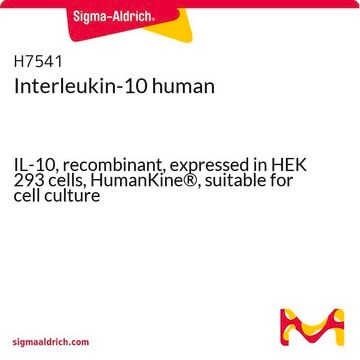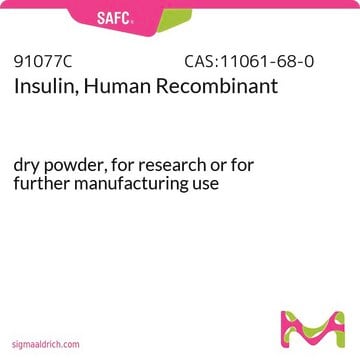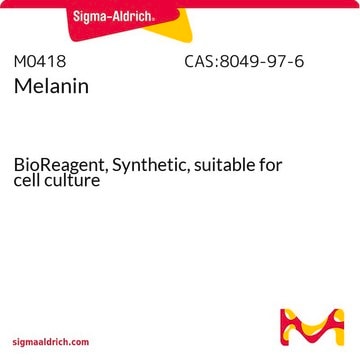M4135
α-Melanocyte stimulating hormone
≥97% (HPLC)
Sinónimos:
α-MSH, α-Melanotropin
About This Item
Productos recomendados
origen biológico
synthetic (organic)
Nivel de calidad
esterilidad
non-sterile
Análisis
≥97% (HPLC)
formulario
powder
solubilidad
water: 1.00-1.04 mg/mL, clear, colorless
Nº de acceso UniProt
Condiciones de envío
ambient
temp. de almacenamiento
−20°C
cadena SMILES
CSCC[C@H](NC(=O)[C@H](CO)NC(=O)[C@H](Cc1ccc(O)cc1)NC(=O)[C@H](CO)NC(C)=O)C(=O)N[C@@H](CCC(O)=O)C(=O)N[C@@H](Cc2c[nH]cn2)C(=O)N[C@@H](Cc3ccccc3)C(=O)N[C@@H](CCCNC(N)=N)C(=O)N[C@@H](Cc4c[nH]c5ccccc45)C(=O)NCC(=O)N[C@@H](CCCCN)C(=O)N6CCC[C@H]6C(=O)N[C@@H](C(C)C)C(N)=O
InChI
1S/C77H109N21O19S/c1-42(2)64(65(79)106)97-75(116)61-20-13-30-98(61)76(117)54(18-10-11-28-78)88-62(103)38-85-66(107)57(34-46-36-84-50-17-9-8-16-49(46)50)94-67(108)51(19-12-29-83-77(80)81)89-70(111)55(32-44-14-6-5-7-15-44)92-72(113)58(35-47-37-82-41-86-47)95-68(109)52(25-26-63(104)105)90-69(110)53(27-31-118-4)91-74(115)60(40-100)96-71(112)56(33-45-21-23-48(102)24-22-45)93-73(114)59(39-99)87-43(3)101/h5-9,14-17,21-24,36-37,41-42,51-61,64,84,99-100,102H,10-13,18-20,25-35,38-40,78H2,1-4H3,(H2,79,106)(H,82,86)(H,85,107)(H,87,101)(H,88,103)(H,89,111)(H,90,110)(H,91,115)(H,92,113)(H,93,114)(H,94,108)(H,95,109)(H,96,112)(H,97,116)(H,104,105)(H4,80,81,83)/t51-,52-,53-,54-,55-,56-,57-,58-,59-,60-,61-,64-/m0/s1
Clave InChI
WHNFPRLDDSXQCL-UAZQEYIDSA-N
Información sobre el gen
human ... POMC(5443)
¿Está buscando productos similares? Visita Guía de comparación de productos
Categorías relacionadas
Amino Acid Sequence
Descripción general
Aplicación
- it has been Intracerebroventricularly (icv) injected to mice for behavioral studies.
- to determine the effect of α−MSH on growth of stationary Nb 2 node lymphoma cell cultures.
- to determine the effect of α−MSH on leptin secretion in the primary cultures of differentiated adipocytes.
- α−MSH promoted melanin production in the B16-F1 cells from murine melanoma cell line.
Acciones bioquímicas o fisiológicas
Adsorbente de anticuerpos
Ligadura / enlace
Otras notas
Código de clase de almacenamiento
11 - Combustible Solids
Clase de riesgo para el agua (WGK)
WGK 3
Punto de inflamabilidad (°F)
Not applicable
Punto de inflamabilidad (°C)
Not applicable
Equipo de protección personal
Eyeshields, Gloves, type N95 (US)
Certificados de análisis (COA)
Busque Certificados de análisis (COA) introduciendo el número de lote del producto. Los números de lote se encuentran en la etiqueta del producto después de las palabras «Lot» o «Batch»
¿Ya tiene este producto?
Encuentre la documentación para los productos que ha comprado recientemente en la Biblioteca de documentos.
Los clientes también vieron
Nuestro equipo de científicos tiene experiencia en todas las áreas de investigación: Ciencias de la vida, Ciencia de los materiales, Síntesis química, Cromatografía, Analítica y muchas otras.
Póngase en contacto con el Servicio técnico











